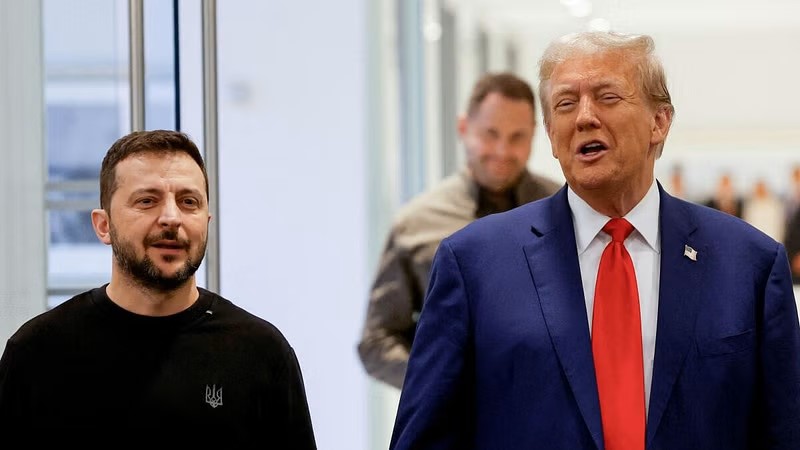Trump Halts Military Aid to Ukraine, Signals Potential Easing of Russia Sanctions
International International NewsPosted by NewAdmin on 2025-03-04 08:52:06 |
Share: Facebook | Twitter | Whatsapp | Linkedin Visits: 21

Former U.S. President Donald Trump has ordered a temporary halt to all military aid to Ukraine, a move that raises concerns over Washington’s commitment to supporting Kyiv in its ongoing war against Russia. This decision, announced on Monday (EST), follows Trump’s heated televised exchange with Ukrainian President Volodymyr Zelenskyy, where Trump accused him of lacking gratitude for U.S. financial and military assistance. Additionally, reports indicate that Trump’s administration is considering easing sanctions on Russia, signaling a potential shift in U.S. foreign policy toward Moscow.
According to a Bloomberg report, a U.S. defense official confirmed that military aid deliveries, including weapons in transit via aircraft and ships, are now paused. The official stated that further assistance would only resume if Ukraine’s leadership demonstrates a “good-faith commitment to peace.” The order has already been communicated to Defense Secretary Pete Hegseth, leading to an immediate suspension of shipments, including those awaiting transit in Poland.
Trump’s stance aligns with his campaign promise to end the Russia-Ukraine war swiftly. During a White House meeting on February 28, Zelenskyy faced criticism from Trump and his deputy, JD Vance, after he asserted that there was “no room for compromise” with Russian President Vladimir Putin. Trump and Vance rebuked Zelenskyy for his rigid position and implied that Ukraine should be more appreciative of U.S. support. In the lead-up to the meeting, Trump had accused Zelenskyy of "gambling with World War III" and even labeled him a "dictator." Despite the tense exchange, Zelenskyy later expressed willingness to meet Trump again to "solve real problems" and signaled openness to a minerals trade deal with the U.S. that had been stalled.
Meanwhile, Trump’s evolving stance on Russia is drawing attention. A Reuters report suggests that his administration has instructed the State and Treasury Departments to prepare a list of sanctions that could be lifted. The Biden administration had imposed over 500 sanctions on Russia, affecting key commodities like crude oil, agricultural exports, and Russian oligarchs. The potential easing of these sanctions is expected to be discussed in upcoming talks between U.S. and Russian officials.
Despite these developments, Trump insists that he has given Russia “nothing but grief” during his presidency. He argued that while previous administrations, including those of George W. Bush, Barack Obama, and Joe Biden, allowed Russia to expand its influence—such as gaining control of Georgia and military submarine bases—he had prevented Moscow from making any gains. Trump also emphasized that his top priority remains curbing illegal immigration, asserting that domestic security issues outweigh foreign conflicts. With Trump’s shifting approach, the future of U.S. support for Ukraine remains uncertain. If his administration proceeds with sanction relief for Russia while maintaining a freeze on military aid to Ukraine, it could significantly alter the geopolitical landscape and impact the war’s trajectory.
Search
Categories
Recent News
- Hyderabad Firm's $700K Foreign Exchange Fraud Unveiled
- Indian-Israeli Alliance: Unlocking AI's Edge Potential
- T20 World Cup 2026: Pakistan Refuses to Face India in High-Stakes Match
- Massive Development Push in Nellore Rural: 240 Projects, One Goal
- Unveiling the Truth: Maxwell Emails Validate Prince Andrew's Scandalous Photo
- Royal Courage: Kate Middleton's Cancer Battle and Message of Hope
- Solar Power Shines on Temple Lands
- Suryakumar's Resurgence: A Masterclass in Adaptability
Popular News
- Navigating IPO Market Dynamics Amid Volatility and Regulatory Changes
- Massive Worldwide Microsoft Outage Disrupts Multiple Sectors
- Panjapur Bus Stand to Reshape TNSTC Routes
- తెలుగుదేశం పార్టీ - పేదరికాన్ని నిర్మూలించడంలో వాగ్దానం
- Universities Embrace Remote Learning Technologies Amidst Ongoing Pandemic